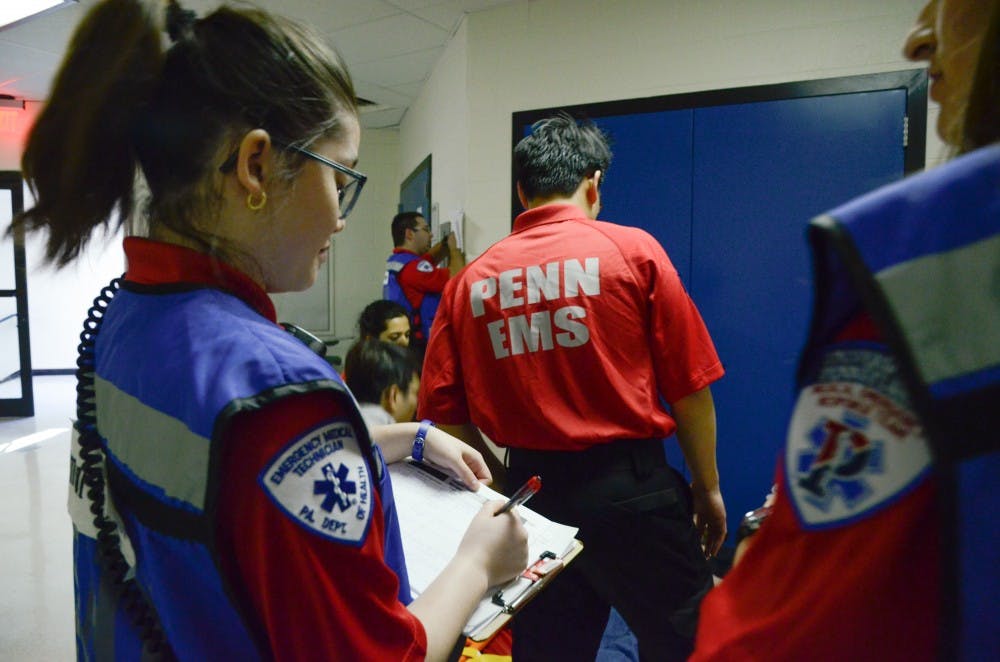People crowded David Rittenhouse Laboratory on Saturday morning as a frenzy of Penn's Medical Emergency Response Team members responded to a bomb explosion — the incident, however, was part of a practice drill for MERT, not an actual emergency.
MERT's hour-long mass casualty incident drill allows the student EMTs to practice responding to large-scale trauma. The whole ordeal lasted for about an hour, with MERT EMTs carrying patients to the designated treatment centers. This training session has, in the past, involved simulations of building collapses, chemical spills, and active shooter situations.
“The whole point of this incidence is to see how MERT EMTs would respond to a potential multiple person incident,” Chief of MERT David Gordon said. He defined a mass casualty incident as one in which the number of patients and the amount of care they require exceed the resources that MERT has to offer.

This drill was composed of 28 EMTs and 20 patients, many of whom were senior MERT members who could assess whether the EMTs were diagnosing them appropriately. This served as a training opportunity for MERT’s underclassmen, who may not have been exposed to such training sessions or a critical scrutiny of performance.
Volunteers also included members of the Alpha Phi Omega community service fraternity and members of the University of Sciences who are also in the process of starting their own Emergency Medical Services team. Different divisions of Penn, especially the Penn Police and the Fire and Emergency Services, were active observers, meaning they were evaluating the drill.
“This is the ninth Mass Casualty Incident Training session that the MERT has held, and we have been involved with every single one of them so far. It’s very realistic and they actually try to treat, triage, and prepare the patients for transfer to an actual hospital. It prepares them for incidences not only within Penn’s campus, but outside of it as well” said Chief Eugene Janda, who was with the Fire and Emergency Services of the Division of Public Safety.
Deputy Chief of Penn Police Michael Fink agreed, saying, “It’s extremely important to have training sessions like these because you never know what kind of incident you can get at a large university like Penn and having 50 EMTs assist us in a MCI would go a long way in emergency.”
RELATED:
Fire crews responded to a HAZMAT situation in Penn's Engineering Quad on Friday
Penn Police morale at an 'all time low' as contract negotiations come to a standstill
While the training session has normally occurred each year, this is the first year that it has taken place during each semester. College senior and previous disaster training officer for MERT Brett Bell said this is part of MERT's effort to expand their disaster response program. He explained MERT is trying to expand their skills.

"We’ve integrated more with the city, we’ve taken on more responsibilities, and we’ve even responded to multiple casualty incidents on campus," Bell said. "We’re pretty good at dealing with patients one on one, but when we’re dealing with one versus three or one versus 5, things get difficult."
This emergency drill focused on perfecting the "triage" process, an important emergency medical response during a mass casualty incident where resources may be limited.
Bell said MERT’s “triage” is a process through which EMTs assess who needs care and in what priority. The EMTs diagnose each on-site patient into one of four categories depending on how urgent their medical needs are, and dispel care to them accordingly.
Bell gave an example of how he played the role of a patient with ruptured eardrums and a small cut on his arm and was appropriately diagnosed through the triage process.
Gordon emphasized that these training sessions play a role in maintaining the quality of EMT response.
“This training session is the culmination of over three months of planning. The EMTs taking part had no clue what emergency they would face, and everything was sudden for them, just as it would have been in real life,” Gordon said.
MERT receives resources they garner through partnerships with FOX Leadership, the Division of Public Safety, Student Health Services, and many others. “A lot of DPS members are here early on a Saturday morning, not because they need to, but because they want to see MERT be successful. They all have families, and we are very grateful that they were able to be here and spare time for us," Gordon said.



